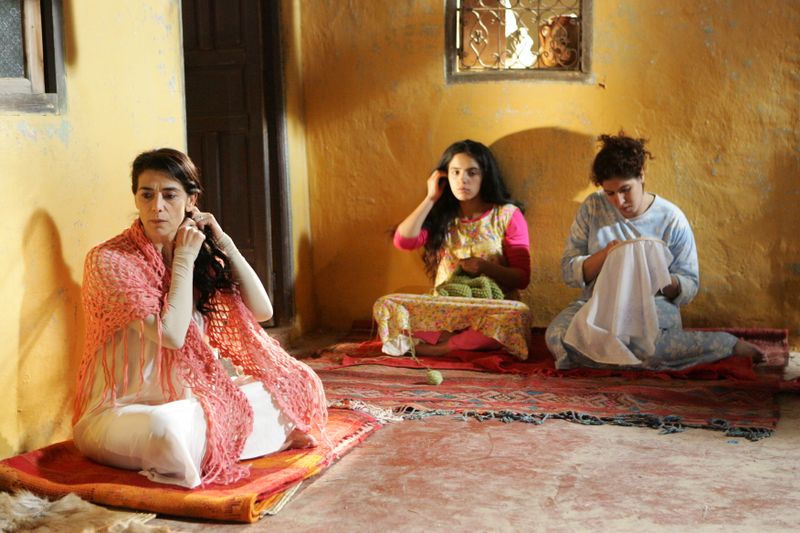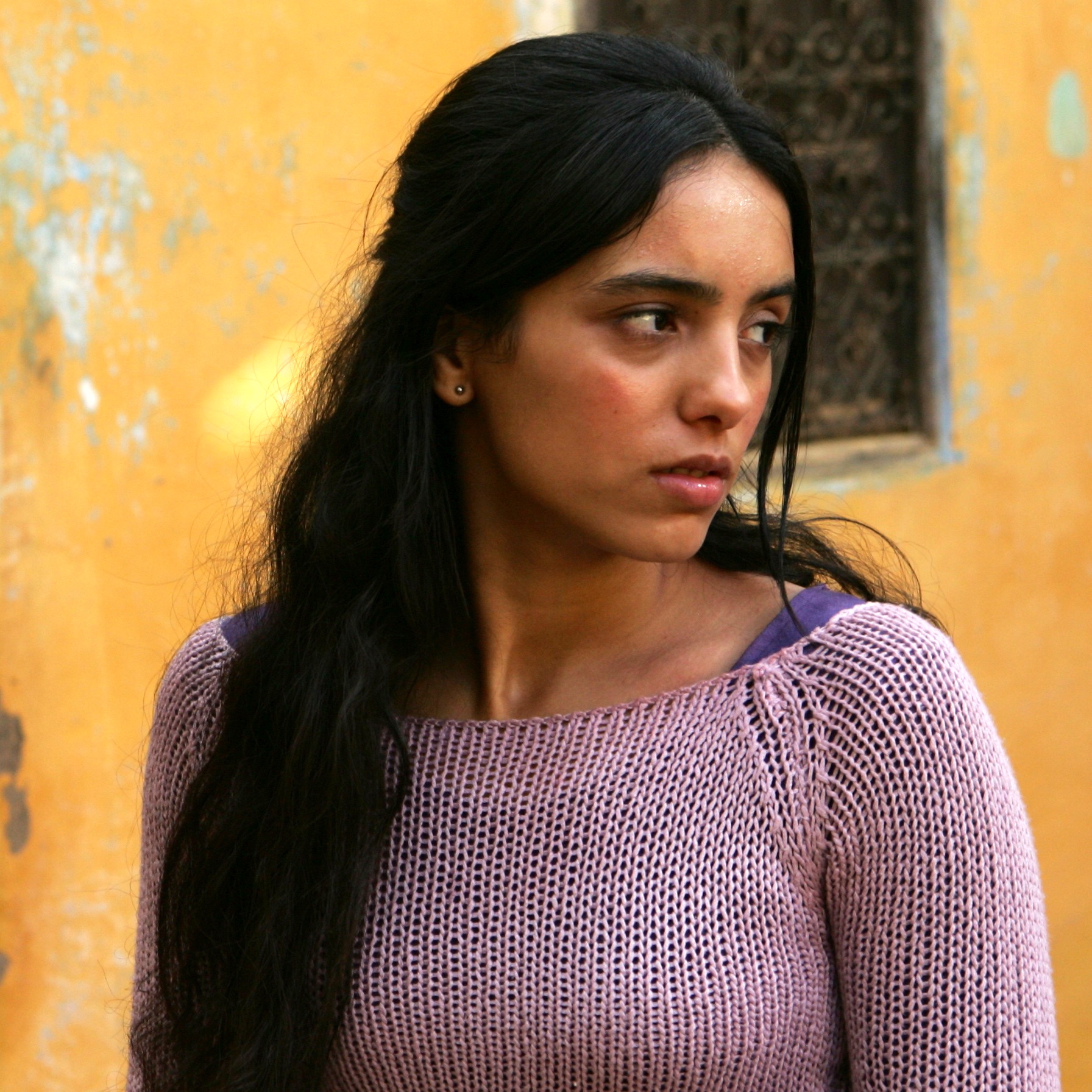Kadija Leclere’s film of love, freedom, and revolution in Morocco
Ruddy-cheeked, precocious Sarah is just another schoolgirl in the convent of a sleepy, snow-covered Belgian village – or at least, that’s what she thinks. After complaining to the local reverend and the nuns at school as to why she wasn’t blessed with a mother or father like her fellow classmates, her estranged father – along with his new wife – makes an unexpected appearance, and for a brief moment, it seems as if Sarah’s wishes have finally been granted. Not taking a particular shining to the man or his indifferent wife, it’s only begrudgingly and with much chagrin that she finally accompanies them on what she innocently believes to be a trip to Paris, wearing a lucky cross furtively given to her by a suspicious nun who knows the little girl is on the point of no return. After she awakes in the backseat of the couple’s car to the chatter of Spanish outside, Sarah slowly begins to surmise that things are amiss. ‘We’re taking a shortcut’, her father deceptively reassures her, as he stuffs a handful of sleeping pills into her tiny palm. As the world around her begins to melt into a melange of light and colour, the happy family heads south towards Morocco, with visions of Belgium and douce France receding far into the distance.
La ilaha illa Allah, a moazzen bellows from the depth of his being atop a village minaret, officially marking a new chapter in the little girl’s life. Finding herself in a strange, colourful environ amidst exotically-garbed people conversing in a brash and guttural tongue, the petrified Sarah decides to make a run for it, only to be dragged back (literally) by her enraged father, who makes things clear, once and for all. ‘This is not Belgium. You’re a Muslim!’ he says angrily, before embarking on yet another business trip to God-knows-where, entrusting her to the care of her aunt and grandmother. Alone again, without a confidante or refuge save in the Lord above, she clasps her palms together in the dead of night in supplication. Mon dieu, aidez-moi!
The awkwardness of her new family, religion, and surroundings aside, Sarah’s real culture shock occurs on her first day of school. Gone are the math, history, and literature lessons she relished miles away in Belgium, and in their stead, a spool and needle. Fast-forward ten-odd years or so, and Sarah and her friends are still knitting insipid oversize jumpers in a drab workshop, in the hopes of scraping together a few dirhams for a measly existence. A burden to her aunt’s husband, who feeds her with disdain, and unwanted by her maniacal, six-toed hermit of a mother who pelts her with stones from afar, life is tough, and the rising food and staple prices aren’t going to make things any easier. Living by the day, savouring the dream of returning to Belgium in the not-too-distant future, life goes on as usual for Sarah, until a chance encounter with the rebellious, hotheaded Nari, who finds himself face-to-face with the young girl after crashing through her roof during a police chase.

Leclere poignantly portrays the harsh realities faced by a young Moroccan woman with lofty ambitions
After a secretive meeting in the seedy Café Shahrzad, not only does Nari’s interest in Sarah become apparent, but also his political ambitions. Constantly involved in scuffles with the local police as a result of participating in protests against rising food prices and the dearth of educational opportunities, Nari seeks Sarah’s help in translating anti-Government leaflets, given her knowledge of French. Young, foolish, and in love, Sarah accepts Nari’s dangerous proposal, becoming his partner in crime. With the ever-increasing pressures of domestic life, however, Sarah also realises that if she is to hold her head high among her relatives, she’ll have to earn more than her current meagre salary. Thus, in-between rendezvouses at shady hangouts and late-night trysts, Sarah manages to become an entrepreneur of sorts, taking her ill-fitting jumpers to a merchant at the bazaar who is surprisingly able to get them off his hands. Before she knows it, Sarah not only blossoms into a passionate revolutionary, but a sly businesswoman as well, and leaves her disgruntled uncle jaw-dropped when she proudly tosses a sack of flour in front of him, thereby reclaiming her unshakable place in the household.
Against a colourful canvas of crimson houses, blue skies, and dyed wool, as well as story of love and revolution, is Kadija Leclere’s powerful commentary on the role of women in traditional Moroccan society. In her feature debut, the Moroccan-Belgian director poignantly portrays the harsh realities faced by a young Moroccan woman with lofty ideals and ambitions, and the recourse available to her. As Sarah matures throughout the film, Leclere highlights the position of women in the workforce, the household, as well as in relationships. Sadly, as she points out, many women are still denied the privilege of a proper education, and marriage, rather than being considered a sacred union, is often looked upon by girls as an escape route, as well as a way for parents to lessen their financial burdens. Despite her new-found purpose in life, financial ‘success’, and having a burgeoning relationship, Sarah knows that Morocco will never be the place for a woman with aspirations such as hers, and thus ever hangs onto her dream of escaping to Belgium.
After the village riots reach their peak, claiming the life of an innocent child, yet another of Sarah’s many suitors arrives to ask for her hand in marriage, although this time, the proposition is not as unsavoury as usual. The man in question has come on behalf of his son, who is already engaged and will be shortly leaving for Belgium in a matter of days with his fiancée. Thus, the marriage will be nothing more than a simple formality, and will provide the escape route Sarah has long been dreaming about. Will she pack it all in and leave for Belgium – which is just as alien now as Morocco once was for her – or settle for a life less extraordinary in her village?

